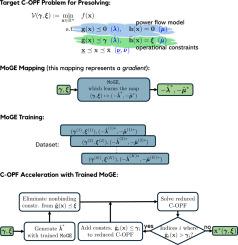Presolving convexified optimal power flow with mixtures of gradient experts
IF 9.6
Q1 COMPUTER SCIENCE, ARTIFICIAL INTELLIGENCE
引用次数: 0
Abstract
Convex relaxations and approximations of the optimal power flow (OPF) problem have gained significant research and industrial interest for planning and operations in electric power networks. One approach for reducing their solve times is presolving which eliminates constraints from the problem definition, thereby reducing the burden of the underlying optimization algorithm. To this end, we propose a presolving framework for convexified optimal power flow (C-OPF) problems, which uses a novel deep learning-based architecture called (Mixture of Gradient Experts). In this framework, problem size is reduced by learning the mapping between C-OPF parameters and optimal dual variables (the latter being representable as gradients), which is then used to screen constraints that are non-binding at optimum. The validity of using this presolve framework across arbitrary families of C-OPF problems is theoretically demonstrated. We characterize generalization in and develop a post-solve recovery procedure to mitigate possible constraint classification errors. Using two different C-OPF models, we show via simulations that our framework reduces solve times by upto 34% across multiple PGLIB and MATPOWER test cases, while providing an identical solution as the full problem.

梯度专家混合求解凸型最优潮流
最优潮流(OPF)问题的凸松弛和逼近在电网规划和运行中获得了重要的研究和工业兴趣。减少求解时间的一种方法是求解,它消除了问题定义中的约束,从而减少了底层优化算法的负担。为此,我们提出了一个求解凸最优潮流(C-OPF)问题的框架,该框架使用了一种新的基于深度学习的架构,称为MoGE(混合梯度专家)。在这个框架中,通过学习C-OPF参数和最优对偶变量(后者可以表示为梯度)之间的映射来减少问题的规模,然后使用该对偶变量来筛选最优时非绑定的约束。从理论上证明了该求解框架在任意C-OPF问题族中的有效性。我们描述了MoGE的泛化特征,并开发了一个解后恢复程序来减轻可能的约束分类错误。使用两种不同的C-OPF模型,我们通过模拟表明,我们的框架在多个PGLIB和MATPOWER测试用例中减少了高达34%的解决时间,同时提供了与完整问题相同的解决方案。
本文章由计算机程序翻译,如有差异,请以英文原文为准。
求助全文
约1分钟内获得全文
求助全文
来源期刊

Energy and AI
Engineering-Engineering (miscellaneous)
CiteScore
16.50
自引率
0.00%
发文量
64
审稿时长
56 days
 求助内容:
求助内容: 应助结果提醒方式:
应助结果提醒方式:


